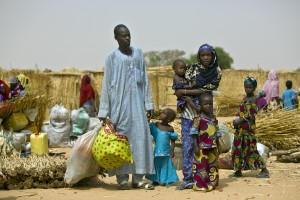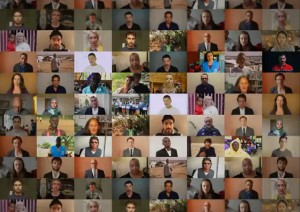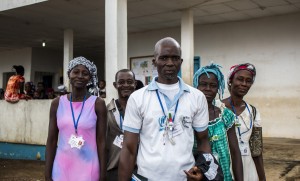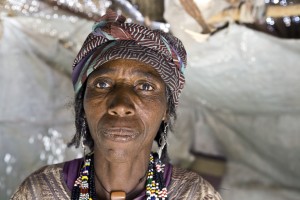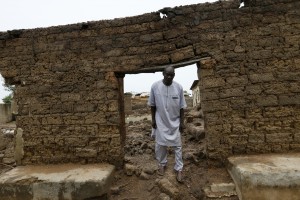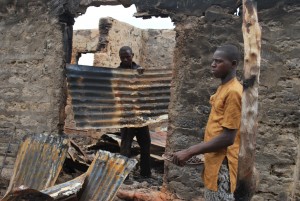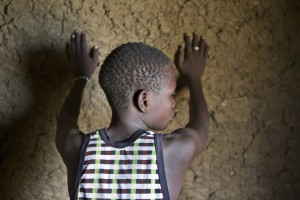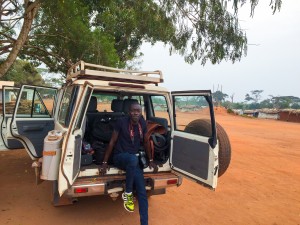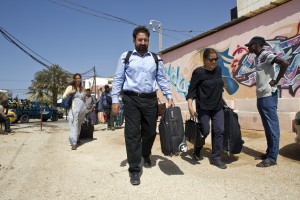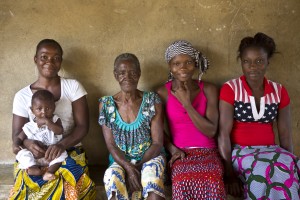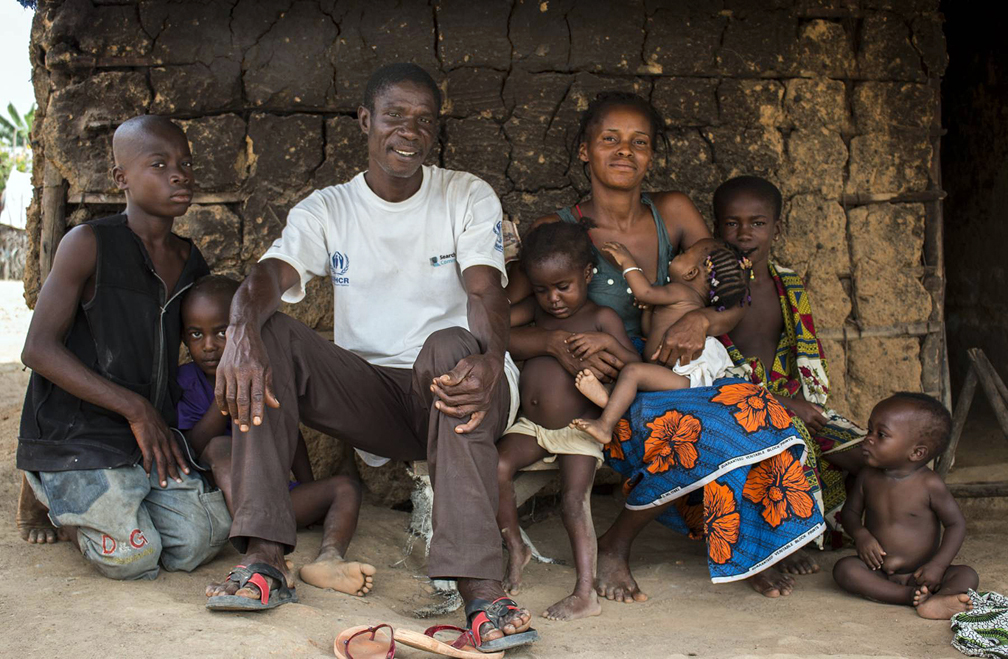Liberia resumes repatriation of Ivorians after Ebola hiatus
11,000 refugees in Liberian camps wish to return home immediately
PROLLO, CÔTE D’IVOIRE, 18 December 2015 (UNHCR) – UNHCR today resumed the voluntary repatriation of tens of thousands of Ivorian refugees from Liberia, which had been interrupted for more than a year by the deadly Ebola outbreak. Some 11,000 of the 38,000 Ivorian refugees in Liberian camps have said they wish to return immediately. One convoy, carrying about 244 people, set off from the coastal town of Harper, in eastern Liberia, for Tabou, in south-western Côte d’Ivoire, taking a ferry to cross the river border.
A second convoy, carrying 401 people, left PTP camp in Grand Gedeh County for Toulepleu in western Côte d’Ivoire.Two more convoys are planned for later this month, bringing the total number of returnees by year’s end to more than 1,000 people. The convoys will pass along special humanitarian corridors because the borders currently remain closed.The returns will continue next January, with road repairs planned to improve access. “This is a very important and encouraging day that will allow the refugees on these convoys to finally return and help rebuild their country and resume normal lives in their own homes after several years in exile”, explained Ndeye Ndour, UNHCR Representative in Liberia.
Among those who clambered on to trucks for the return journey was Ivorian father Brégui, who shed a few tears as his friends and neighbours waved and sang their goodbyes. “We will miss our life here. My children will miss their friends, but as hard departing is, we have to go home,” he said. “Today is the day we have all been waiting for.”
On arrival in Tabou and Toulepleu, the returnees will spend a day in transit centres, where they will be given a hot meal and undergo medical screening, including for Ebola. An awareness campaign aimed at reducing the risk of Ebola-related discrimination and stigmatization will be conducted in the communities where they will be returning. Before they are taken back to their towns or villages, the returnees will be given kitchen utensils, mattresses, mosquito nets and other basic aid items by UNHCR to help them rebuild their lives as well as WFP food rations for three months.
UNHCR will help the returnees reintegrate in their homeland, with income-generation programmes, training and start-up aid. The Côte d’Ivoire government has put in place a number of programmes to help the returnees regain access to their lands and for children to get access to education. Some 300,000 people fled the violence that followed presidential elections in November 2010 in Côte d’Ivoire, including more than 200,000 who fled to neighbouring Liberia. The crisis ended in April 2011 following a political settlement that confirmed Alassane Ouattara as president.
The voluntary repatriation of Ivorian refugees started in late 2012. While UNHCR facilitated the return of some 40,000 refugees from Liberia, an additional 160,000 are believed to have returned on their own. The outbreak of Ebola in West Africa last year caused the closure of the land border between Côte d’Ivoire and neighbouring Liberia and Guinea, forcing UNHCR and its partners to suspend the repatriation operation in July 2014. No Ivorian refugee in Liberia has contracted Ebola and robust prevention measures have been implemented in the camps since the outbreak began in March 2014.
Côte d’Ivoire has been largely peaceful since April 2011, but sporadic attacks have taken place in the south-west of the country. Security in the area has been reinforced, with additional measures put in place to ensure safe passage for the convoy. Côte d’Ivoire’s government has concentrated on building the economy and development.
“This durable solution requires a multidimensional response, and I call on all humanitarian and development actors to also accompany the Ivorian authorities in implementing the National Development Program”, said Mohamed Askia Toure, UNHCR Representative in Côte d’Ivoire. “It is only through greater synergy of action that we can contribute to the consolidation of peace, unity and social cohesion and promote reconciliation and emergence”.

An Ivorian refugee woman prepares her luggage for repatriation. Around 250 Ivorian refugees have signed up to be part of the first return convoys from Little Wlebo, Liberia, to their home villages in Côte d’Ivoire. The governments of Liberia, Côte d’Ivoire and UNHCR have agreed to resume the voluntary repatriation process halted due to the Ebola outbreak in 2014. Some 300,000 persons fled the Ivorian post-electoral violence in November 2010, including more than 240,000 to Liberia. UNHCR / DIANA DIAZ
Contacts
In Liberia and accompanying the convoys: Diana Diaz, Public Information Officer, diazdi@unhcr.org, tel : +231 88 08 46 331
In Abidjan : Nora Sturm, Public Information Officer, sturmn@unhcr.org, tel: +225 06 43 07 61
In Dakar : Hélène Caux, Senior Regional Public Information Officer, caux@unhcr.org, tel: +221 77 333 1291
In Geneva : Leo Dobbs, Communications Officer, dobbs@unhcr.org, tel: +41 79 883 6347
Le texte en français:
Le Liberia reprend le rapatriement des Ivoiriens après l’interruption causée par le virus Ebola
11,000 réfugiés dans les camp libériens veulent retourner chez eux aussitôt que possible
PROLLO, COTE D'IVOIRE, 18 Decembre 2015 (HCR)- Le HCR a reprise aujourd’hui le rapatriement volontaire de plusieurs dizaines de milliers de réfugiés ivoiriens au Liberia. Cette opération avait été suspendue pendant plus d'un an à cause de l'épidemie due au virus Ebola. Environ 11,000 des 38,000 réfugiés ivoiriens au Liberia ont exprimé leur désir de rentrer chez eux dès que possible.
Un convoi transportant 244 personnes a quitté la ville côtière de Harper, dans l’Est du Liberia, pour se rendre à Tabou, dans le sud-ouest de la Côte d’Ivoire. Un second convoi, avec à bord 401 personnes, a quitté le camp de réfugiés de PTP dans le comté de Grand Gedeh du Liberia, pour se rendre à Toulepleu, dans l’Est de la Côte d’Ivoire.
Deux autres convois sont prévus plus tard dans le mois, portant ainsi le nombre total de rapatriés à 1000 d’ici la fin de l’année. Les convois emprunteront des corridors humanities spéciaux car les frontières restent fermées. Les retours continueront en janvier lorsque les routes, en ce moment difficilement praticables, seront améliorées. « Ceci est une journée très importante et encourageante qui permettra aux réfugiés de ces convois de finalement revenir et aider à reconstruire leur pays et de reprendre une vie normale dans leurs propres maisons, après plusieurs années d'exil », explique Ndeye Ndour, la Représentante du HCR au Liberia.
A leur arrivée à Tabou et à Toulepleu, les rapatriés passeront une journée dans les centres de transit, où ils recevront un repas chaud et se soumettront à un examen médical, y compris un dépistage du virus Ebola. Une campagne de sensibilisation visant à réduire la discrimination et la stigmatisation liée à la maladie sera menée dans les communautés d’origine ou d’accueil des rapatriés.
Avant qu’ils ne regagnent leurs villages, les rapatriés recevront des ustensiles de cuisine, des matelas, des moustiquaires et d’autres articles d’assistance élémentaire pour leur permettre de reconstruire leurs vies, ainsi que des vivres pour une durée de trois mois du Programme Alimentaire Mondial.
Le HCR facilitera la réintégration des rapatriés dans leur pays d’origine, notamment à travers des activités génératrices de revenus, des formations et une assistance financière. Le Gouvernement de la Côte d’Ivoire a mis en place plusieurs programmes pour aider les rapatriés à retrouver leurs terres et aux enfants d’aller à l’école.
Environ 300.000 personnes ont fui la Côte d’Ivoire suite aux violences engendrées par les élections présidentielles en novembre 2010, dont plus de 200.000 qui se sont réfugiées au Liberia. La crise a pris fin en avril 2011 après qu'Alassane Ouattara a été confirmé comme Président de la Côte d’Ivoire.
Le rapatriement volontaire des réfugiés ivoiriens au Liberia a débuté fin 2012. Le HCR a facilité le retour d’environ 40,000 réfugiés, et on estime que 160.000 de plus sont rentrés par leurs propres moyens.
L’épidémie d'Ebola en Afrique de l’Ouest a engendré la fermeture des frontières terrestres entre la Côte d’Ivoire et le Liberia et la Guinée, et a obligé le HCR et ses partenaires à suspendre les opérations de rapatriement en juillet 2014. Aucun réfugié ivoirien au Liberia n’a contracté la maladie et des mesures robustes de prévention ont été mises en place dans les camps depuis mars 2014, lorsque l’épidémie a commencé.
Le conflit en Côte d’Ivoire a pris fin en avril 2011 mais des incidents sécuritaires continent dans le sud-ouest du pays. La sécurité dans la zone a été renforcée, notamment pour assurer le passage en toute sécurité des convois. De manière générale, la paix règne sur le territoire ivoirien et le Gouvernement se concentre sur le développement et l’économie.
« Cette solution durable nécessite une réponse multidimensionnelle, et j’appelle tous les acteurs humanitaires et de développement à également accompagner les autorités ivoiriennes dans la mise en œuvre du Programme National de Développement » souligne Mohamed Askia Toure, Représentant du HCR en Côte d’Ivoire. « Ce n'est qu'à travers une plus grande synergie d’action que nous pourrons davantage contribuer à la consolidation de la paix, de l’unité et de la cohésion sociale, et à l’avènement d’une réconciliation et d’une émergence réussies. »
Contacts
Au Liberia et accompagnant les convois: Diana Diaz, Chargée de l’information publique, diazdi@unhcr.org, tel : +231 88 08 46 331
A Abidjan : Nora Sturm, Chargée de l’information publique, sturmn@unhcr.org, tel: +225 06 43 07 61
A Dakar : Hélène Caux, Administrative régionale chargée de l’information publique, caux@unhcr.org, tel: +221 77 333 1291
A Genève : Leo Dobbs, Officier de communications, dobbs@unhcr.org, tel: +41 79 883 6347
